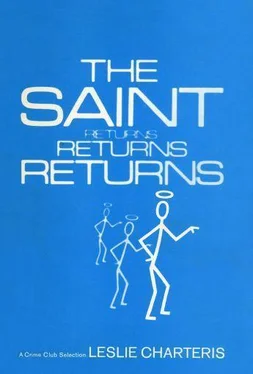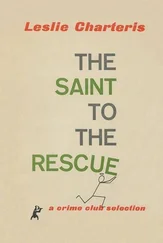Leslie Charteris - The Saint Returns
Здесь есть возможность читать онлайн «Leslie Charteris - The Saint Returns» весь текст электронной книги совершенно бесплатно (целиком полную версию без сокращений). В некоторых случаях можно слушать аудио, скачать через торрент в формате fb2 и присутствует краткое содержание. Город: Garden City, New York, Год выпуска: 1968, Издательство: Crime Club by Doubleday, Жанр: Крутой детектив, на английском языке. Описание произведения, (предисловие) а так же отзывы посетителей доступны на портале библиотеки ЛибКат.
- Название:The Saint Returns
- Автор:
- Издательство:Crime Club by Doubleday
- Жанр:
- Год:1968
- Город:Garden City, New York
- ISBN:нет данных
- Рейтинг книги:5 / 5. Голосов: 1
-
Избранное:Добавить в избранное
- Отзывы:
-
Ваша оценка:
- 100
- 1
- 2
- 3
- 4
- 5
The Saint Returns: краткое содержание, описание и аннотация
Предлагаем к чтению аннотацию, описание, краткое содержание или предисловие (зависит от того, что написал сам автор книги «The Saint Returns»). Если вы не нашли необходимую информацию о книге — напишите в комментариях, мы постараемся отыскать её.
The Saint Returns — читать онлайн бесплатно полную книгу (весь текст) целиком
Ниже представлен текст книги, разбитый по страницам. Система сохранения места последней прочитанной страницы, позволяет с удобством читать онлайн бесплатно книгу «The Saint Returns», без необходимости каждый раз заново искать на чём Вы остановились. Поставьте закладку, и сможете в любой момент перейти на страницу, на которой закончили чтение.
Интервал:
Закладка:
They offered no hints or comments. They just watched as if to see whether the so far harmless and mysterious little drama in which the Saint was involved might enlarge to include them — in which case then: interest might become more active.
Their solemnity reminded Simon of the Secret Service men he had seen during appearances of American presidents — aloof, alert, and hair-triggered. He even thought he detected a bulge beneath the broad-faced one’s broad-lapeled unstylish jacket.
No lightning thought processes such as the Saint’s were necessary to draw the essential conclusions. He had on his first quick trip down the corridor decided that these wakeful gentlemen were a very probable tipoff to the whereabouts of the fabled Colonel Smolenko. Neither of them possessed the aura of cleverness which would expectedly emanate from the Colonel himself.
Simon sauntered back along the corridor. When he came abreast of the two sentinels, who made no pretense of not staring at him, he stooped all of a sudden and squinted out the window as if he had seen something startling.
That was sufficient to distract his travelling companions long enough for him to open the compartment door they were guarding, step inside, and instantly throw the bolt.
The Saint did not need to understand much Russian to disentangle the frightened word tovarishtch from the heavy pounding of fists on the door.
He turned to see his prize, and for once even Simon Templar was momentarily at a loss: Colonel Smolenko seemed to be a woman.
3
She looked at him coolly from her seat by the window: lovely Slavic cheekbones, fine lips devoid of make-up, and such large brown eyes that the fact she was pointing a pistol at Simon seemed entirely anticlimactic. If her dark hair had been less tightly pulled to the back of her head, and if she had worn something more fetching than a raincoat which probably had relatives among the nearest circus tents, she could have competed on all points with the distracting rabbits of the Berlin Bunny Club.
“Open the door,” she said in English, gesturing with her automatic.
“I’m here to help you,” said Simon. “Pardon me if I seem to gape, but I wasn’t expecting a woman.”
“Does it matter?”
“It could matter very much under certain circumstances.”
“Keep your hands away from your body and turn and open the door.”
Her English was strongly accented but clearly pronounced, and her determination that Simon should obey her more or less promptly or have his liver ventilated was just as clear.
He unlocked the door and immediately was in the ungentle hands of the Russian Secret Police.
“What you do here?” the big one asked, pinning the Saint’s arms behind him as the other despoiled his pockets of wallet, keys, and even small change.
Simon spoke to the beautiful Colonel.
“I’ve come to warn you that there’s a man aboard this train who very likely intends to see you dead before you reach Paris.”
“There are many men who intended to see me dead and ended up dead themselves,” she said with cold arrogance.
“I don’t doubt that in the least. My compliments.”
Smolenko put down her pistol and lay aside the book which had fallen to her lap when her compartment was invaded. She took the passport which the smaller guard offered her from the Saint’s jacket pocket.
“I think I do not need to look,” she said, with the most frosty trace of a smile. “Simon Templar.”
The Saint responded with a more friendly smile of his own. He bowed his head slightly.
“I’m flattered that news of my infamy has spread as far as the Kremlin.”
“I have a photographic memory, and in our central office we have constantly updated files which inform us of the movements of any persons of interest who are in the area where I am going.”
“It’s nice to be of interest, Colonel.”
The grip which the burly guard kept on Simon’s arms was beginning to become irritatingly uncomfortable. The Saint knew a swift motion which would not only break the hold but send the holder to the hospital for a month, but that did not seem the best strategy for maintaining this temporary thaw in the Cold War.
“Do you mind if I stand up by myself?” he asked mildly. “As you can see, I have no weapons.”
“Ivan,” the Colonel said to the big guard, and continued in Russian.
Simon was freed, and he rubbed circulation back into his muscles. Ivan stationed himself at the door while his smaller, triangular-faced colleague produced a pistol that somehow seemed much too big for him and kept it pointed at the Saint.
“You may not leave,” Smolenko said. “No one is to know who I am.”
“I have no desire to leave,” responded Simon with exaggerated gallantry. “Such congenial company? Such heavy artillery? Besides, now there are enough of us for a rubber or two of bridge.”
“Sit down,” Smolenko said. “Before you are killed, we must talk a little. Ivan, go order some tea.”
Ivan stared dubiously at his chief. Smolenko said something to him in Russian, and he shrugged and left the compartment. The other man took up the watch at the door. Simon was still standing.
“Now,” Smolenko said. “Sit down. Vis-à-vis.”
“I prefer tête-à-tête,” said Simon, “but you’re the hostess.”
He sat down opposite her, crossed his legs, and relaxed. The comely colonel kept her eyes fixed on his face but showed no particularly urgent interest in anything he might have to reveal.
“You could have Raskolnikov there put away his hatchet,” Simon said finally. “As I told you, I’m here for the sole purpose of saving your life.”
“His name is Igor, and I give the orders, and I have no need of anyone to save my life.”
“Apparently not, but don’t you ever consider taking well-intended advice?”
“From bourgeois agents? Hardly.”
Simon looked pained.
“Sticks and stones may break my bones...”
“I do not understand.”
Obviously, she did not like not understanding.
“It’s just a saving. You really speak English very well.”
“Anything it is necessary to do should be done well.”
“A very sound maxim.”
Ivan returned, spoke in Russian to Smolenko, and then — with bear-like pride in his linguistic achievements — addressed Simon in English.
“Tea come.”
“Excellent,” said the Saint. “And well spoken.”
Ivan’s ruddy countenance softened a little.
“Thanks you.”
“You’re quite welcome.”
The four rode in silence for what must have been a mile or two, and all the time Smolenko just looked at him. The first step in some Asiatic method of wearing him down? Or was she searching the files of her photographic memory for information about him?
There was a soft knock at the door.
“Tea,” said Ivan, and reached for the handle.
“Wait,” Smolenko broke in. “We must give a tip, I think.”
She thumbed through her book.
“Despicable bourgeois practice. In lieu of social justice you give measly alms.”
“Measly alms,” Simon repeated admiringly. “That’s very good. But you must get over this thing about the bourgeoisie. They’re really very clean, industrious people. Salt of the earth, and all that jazz. Tipping isn’t their idea of fun — it’s the proletariat that insists on it.”
“The official recommendation is one mark,” the Colonel announced coldly.
She produced a coin purse, inspected both sides of a pfennig, closely examined a big five-mark piece. Simon reached over and selected a silver mark.
“There.”
She flushed slightly, and Igor, who had started forward, relaxed.
“Now,” she said.
Читать дальшеИнтервал:
Закладка:
Похожие книги на «The Saint Returns»
Представляем Вашему вниманию похожие книги на «The Saint Returns» списком для выбора. Мы отобрали схожую по названию и смыслу литературу в надежде предоставить читателям больше вариантов отыскать новые, интересные, ещё непрочитанные произведения.
Обсуждение, отзывы о книге «The Saint Returns» и просто собственные мнения читателей. Оставьте ваши комментарии, напишите, что Вы думаете о произведении, его смысле или главных героях. Укажите что конкретно понравилось, а что нет, и почему Вы так считаете.












